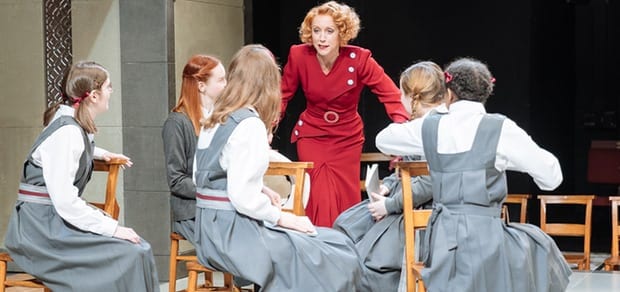The Donmar’s production of The Prime of Miss Jean Brodie is faultless. It will inspire actors to perform, directors to create, playwrights to put pen to paper – and most importantly, allow audiences to experience theatre at its best. David Harrower’s sumptuous adaptation of Muriel Spark’s 1961 novel sings with wit and poignance. Miss Jean Brodie’s transformative impact on her Junior school pupils is spellbindingly told through flashbacks. The relatable scenes of school life provide the political backdrop of 1930s Edinburgh. The play’s allusions to war, fascism and divides within Christianity are explored plainly, but without detracting from the plot’s essentially human story.
Brodie identifies with Mussolini, training up her girls to be ‘heroines’ and deciding their fates. She fills them with hope and optimism, ambition and creativity, whilst imposing her own exacting standards. Friendships are made and broken and as the girls mature, they learn of the flaws in Miss Brodie’s lessons. Lia Williams perfectly captures Jean’s complex attachment to her “girls”. She is devoted, whilst trying to live vicariously through them with heart wrenching results. They witness and experience the relationships she’s too wary to throw herself into first hand. Williams embodies Brodie’s demand for loyalty, her voice is both silky and electrifying, her movements grand and theatrical.
Every performance feels naturalistic and dramatic as the cast come together effortlessly. Polly Findlay’s direction is sublime, each scene seems to organically melt into the next. The minimalist set is highly symbolic, which compliments the rich script. The school bells that punctate the comings and goings of classrooms are dotted round the set. This inevitably evokes Donne and Hemingway, especially with the Spanish Civil war playing out off stage. The reminder of death hammers home the girls’ growth and maturity as they can’t stay idealistic eleven-year olds forever. The play opens with the bells ringing an eerie tune, tolling for the tragedy to come. It is wonderfully satisfying to witness a play woven so flawlessly, with every element enhancing the whole. The audience is fully enveloped in the drama of Jean Brodie’s decline, as this play is truly at its prime.

